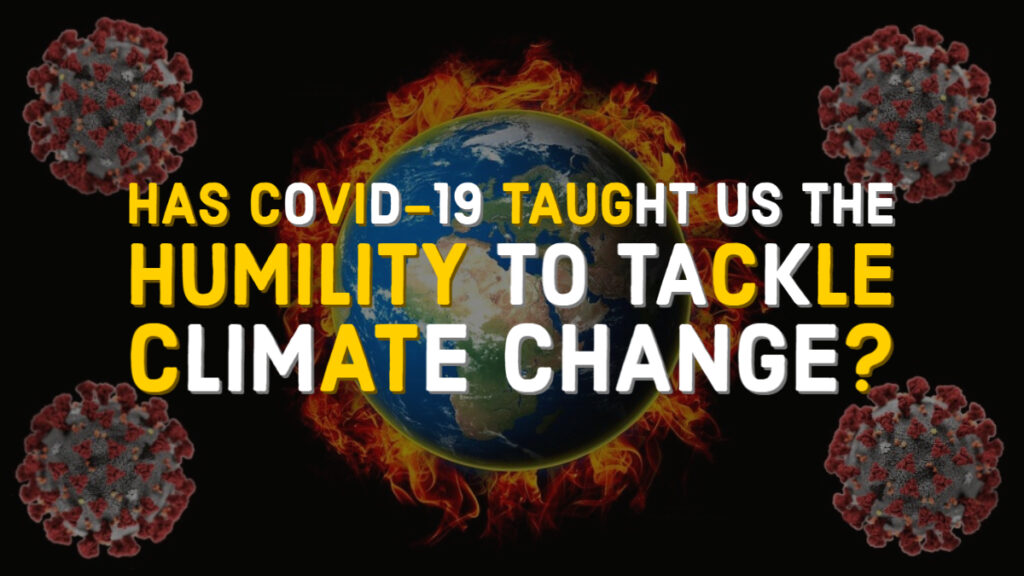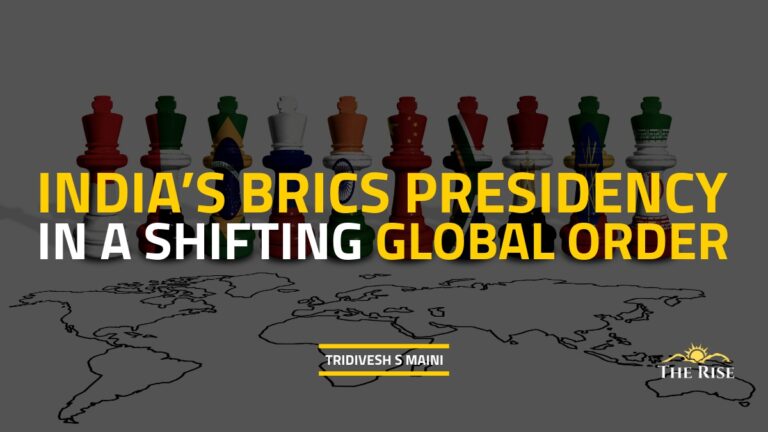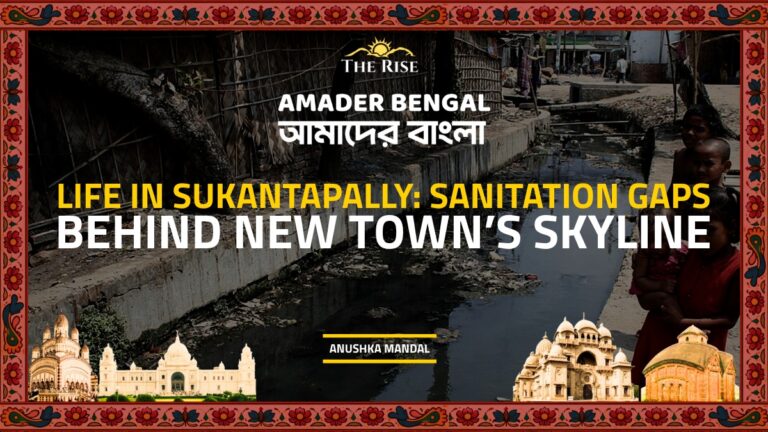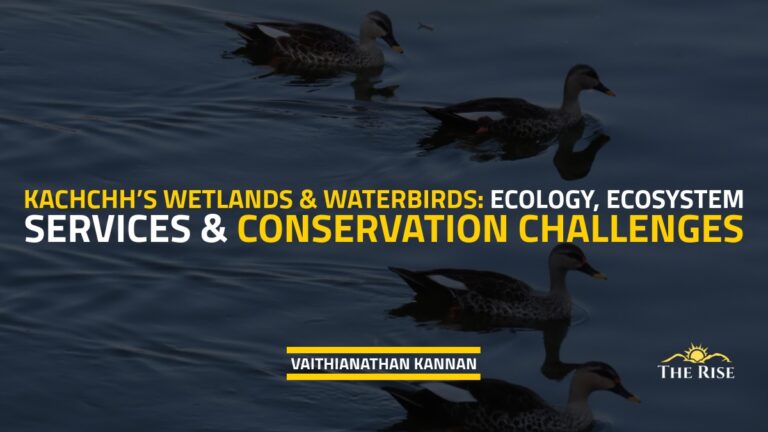The COVID-19 pandemic has humbled the world. It is not just a public health crisis. It is a global economic and humanitarian crisis that demonstrates the interconnectedness of humankind. It is also an ecological crisis, that has forcefully brought mother nature back in context.
It has been suggested that COVID-19 is only one manifestation of the larger climate crisis afflicting our planet today. While we may argue about whether the disease was caused by climate change or not, the similarity between the ongoing pandemic & the response to it and the trends associated with climate change is quite uncanny.
COVID-19 has impacted the whole world and no individual country, no matter how powerful, can escape unscathed. The virus may have originated in China, but the consequences of both the infection as well as response to the pandemic are being felt in every country.
The change in social norms and the ways of functioning that have resulted from this pandemic will also lead to psychological changes that will persist long after it is over.
Like climate change, the COVID-19 pandemic is also likely to be an inter-generational issue. The impact of our action or inaction in response to the viral infection will affect the lives of the next generation. The tangible impacts on the economy will certainly create ripple effects lasting well into the next few decades, if not longer. The change in social norms and the ways of functioning that have resulted from this pandemic will also lead to psychological changes that will persist long after it is over.
Also Read: Time to educate about nature!
The scientific community from across the world has mobilised quite rapidly to study the virus, its characteristics, strategies for prophylaxis and treatment, vaccine development, drug development, and so on. Countries have been coordinating to ensure the movement of essential supplies, public health equipment, and drugs. International agencies like the World Health Organisation have been offering technical guidance, policy advice, and in-country support to health decision-makers. Others like the World Bank and the International Monetary Fund are being called upon to provide financial assistance to governments and help cushion the global economy so as to enable it to recover once the public health crisis subsides down. Given this, it may seem that all hands are on deck at every level within and across the nations to manage the pandemic.
However, the response to the pandemic has already exposed the fault lines and weaknesses that have also prevented robust climate action. The ideological failure of capitalism and libertarianism in tackling global challenges, requiring concerted action for global public goods, is palpable. The United States has been a disappointment in terms of climate action, despite its status as a superpower and a developed economy with large carbon emissions. This is echoed in the country’s ineffectiveness in managing the pandemic and leading the world in the number of COVID-19 cases and fatalities (as of August 14, 2020).
Also Read: Air Pollution and COVID-19
The geopolitical ruptures that hamstring response to climate change have been in the display even during the pandemic. Consider the questions, surrounding China’s handling of the outbreak, the European Union’s tardiness in shipping supplies to Italy, and the Organisation of Islamic Cooperation’s criticism of India, that have all scuttled a unified response to the public health crisis. The continued political one-upmanship in the face of crisis is particularly disheartening, thwarting any hopes that the international community may, in fact, fulfill obligations under the Paris agreement.
The exact impacts of climate change on local populations will be similarly hard, if not impossible, to predict!
Even as global cooperation falters, countries are likely to face competing priorities within their boundaries. National and sub-national policymakers will be forced to make high-stakes choices within short timeframes and without adequate information. We are seeing this dilemma in action with the COVID-19, where experts are trying to figure out its characteristics in real-time. While there has been a lot of information, the dynamics associated with demography, economic activity, system preparedness and efficiency of governance make it difficult to predict the impact of the disease or the appropriate local policy response. Countries have chosen a wide variety of responses based on their own contexts and capabilities ranging from lockdowns, closing of borders, mass testing, physical distancing, and quarantines for their populations.
The exact impacts of climate change on local populations will be similarly hard, if not impossible, to predict! While we have become better at projecting changes in climatic parameters for regions and at shorter timescales, we still do not know how individual countries or populations within countries might be impacted.
The economically vulnerable such as the homeless, poor migrants, daily-wage earners, blue-collar workers have proved unable to cope with measures like lockdowns and physical distancing advocated to flatten the infection curve.
Another parallel between the pandemic and climate change is that the secondary impacts may end up being more damaging than the direct impacts of the crisis. The pre-existing conditions of individuals are determining how successful they are in fighting off the SARS-Cov2 infection. Those with co-morbidities and weakened immune systems due to age or other factors are the ones who are most likely to succumb to the disease.
At the sociological level, the economically vulnerable such as the homeless, poor migrants, daily-wage earners, blue-collar workers have proved unable to cope with measures like lockdowns and physical distancing advocated to flatten the infection curve. Poor communities in densely populated areas are also likely to suffer disproportionately from other diseases by virtue of being hunkered together in close spaces without adequate supplies of food and drugs. As temperatures rise, poor households in tropical countries will suffer negative impacts of heat stress that will be more severe without the respite offered by trees and the outdoor breeze.
People living in poorer countries are also the most vulnerable to the effects of climate change, as they depend much more on rainfall and natural resources for their food and income.
Similarly, climate change reinforces inequities both across countries and within countries. People living in poorer countries are also the most vulnerable to the effects of climate change, as they depend much more on rainfall and natural resources for their food and income. Estimates suggest they are also at least four times more likely to be displaced by extreme weather events, that will become more frequent and intense as a result of climate change.
Also Read: Post-Corona Recovery through Employment Generation in Forestry
The long-term response to both COVID-19 and the looming climate crisis will require a comprehensive, multi-sectoral response that considers the economic, sociological, and political dimensions. Our experience so far has demonstrated the failings of our current top-down approach in demonstrating empathy and solidarity of the kind that’s necessary to tackle complex, multi-factorial, and rapidly evolving health and environmental challenges. The COVID-19 crisis is an opportunity to learn from these failings and move towards an equity-focussed, evidence-based, bottom-up system.
Policy-making has to re-prioritize the public good instead of competition for private gain. As leaders across the world face choices on the nature of public spending, sectors to prioritize, and economic activities to incentivize, they must be guided by considerations of the long-term impact of their decisions on the most vulnerable in the society. Mahatma Gandhi had suggested the following test for decision-makers – “Recall the face of the poorest and weakest man you have seen and ask yourself if the step you contemplate is going to be of any use to him”. This kind of thinking moves us closer to the kind of bottom-up reform that can make possible a greener world without having to lock down the whole global economy.
Can we learn lessons from COVID-19 and apply them to solving arguably the greatest challenge in front of humanity – climate change?
Disclaimer: The views expressed in this article are of the author solely. TheRise.co.in neither endorses nor is responsible for them.
About the author
Dr. Neethi V Rao is Health Policy & Systems Research Consultant working as Postdoctoral Research Fellow at the Centre for Climate Change and Sustainability, Azim Premji University, Bengaluru, India. She is also the Adjunct Faculty at the Institute of Public Health, Bengaluru.







Pingback: Save Foresters, Save Forests: The Forgotten Service - TheRise.co.in
Pingback: COVID-19 Vaccine: Who First? - by Anviti Mishra - TheRise.co.in
Pingback: COVID giving inevitable Climate-crisis - TheRise.co.in
Pingback: The Dead Cannot Cry Out for Justice - TheRise.co.in
Pingback: Differential Pricing of COVID Vaccines in India: Moral or Amoral? - TheRise.co.in
Pingback: Impact of Technology and Innovations on Humans - TheRise.co.in